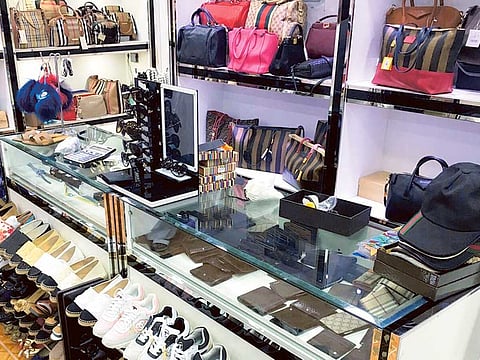New app to help Dubai shoppers fight fakes, choose perfect consumer products
Dubai Municipality launches smart product registration system which will be complemented with mobile application

Dubai: Not sure whether you're buying the real article or a knock-off?
Fret no more. Soon, Dubai shoppers will be able to check whether consumer products are fake or genuine — and even match up their health profile with the product specifications, thanks to a new mobile app on the anvil.
Dubai Municipality on Monday launched a smart, integrated system for classification and registration of consumer products called “Montaji,” which will be complemented with a mobile app with the same name.
It is now compulsory for all consumer safety products such as health supplements, cosmetic and personal care products, perfumes, detergents, soaps, packaging materials and biocides such as antibacterial products in Dubai to be registered with the Montaji system, said Dr Naseem Mohammed Rafee, head of Consumer Product Safety Section.
“When consumers have any doubt about any such products, they can enter the bar code or name of the product in the Montaji system and verify the details. They can find out if the product is actually registered with us or not and the specifications of the product,” she told Gulf News.
Consumers can report violations through the municipality’s call centre 800900.
Health profiling
Within two months, the municipality will also launch a mobile app with the same name, said Ahmad Mohammad Kajoor, head of IT Infrastructure at the municipality.
“The app will enable consumers to scan the bar code of the products and get the product details immediately. In the next phase, we will enable the app to use consumers’ health profile so that they can check if certain products are suitable for them,” he said.
“For example, once the health profiling of a consumer is fed on the app, he can scan the product details and check the risk the product can pose in case of pregnancy and if the consumer allergic to certain ingredients etc”
The app will also have the provision to report violations instantly. The system also has the advantages of cutting down the time frame for registration of products and reducing the cost of the service which will benefit companies.
For example, Rafee said, a company registering 10 colours of a lipstick brand had to apply 10 times before and each time they had to pay Dh200 fee. “Now they can pay Dh200 for the first time and Dh10 each for the rest of the colours.”
“The system is also intelligent enough to detect when somebody is trying to re-register a product which has already been rejected due to non-compliance. It will send out alerts to our staff when someone is trying to register the similar product details by hiding the ingredients or other specifications that are not complying with our requirements,” she added.
Ambitious strategy
Al Awadhi said the new system is an important component of health and environment strategy launched by Dubai Executive Council in collaboration with Dubai Municipality.
“This strategy goes beyond the traditional solutions through ambitious and sustainable projects and programmes that explore the future. This is very important for us considering the huge volume of products that are coming to Dubai,” he pointed out.
Dubai recorded a whopping 755,000 tonnes of consumer products for import and re-export in 2016, an increase of 17 per cent compared to the figures in year 2012.
The total number of registered consumer products accounted for 65,224 by mid-2017 while the market share of only perfumes and cosmetic products accounted for Dh21 billion in 2016, figures released at the event said.
Sign up for the Daily Briefing
Get the latest news and updates straight to your inbox



